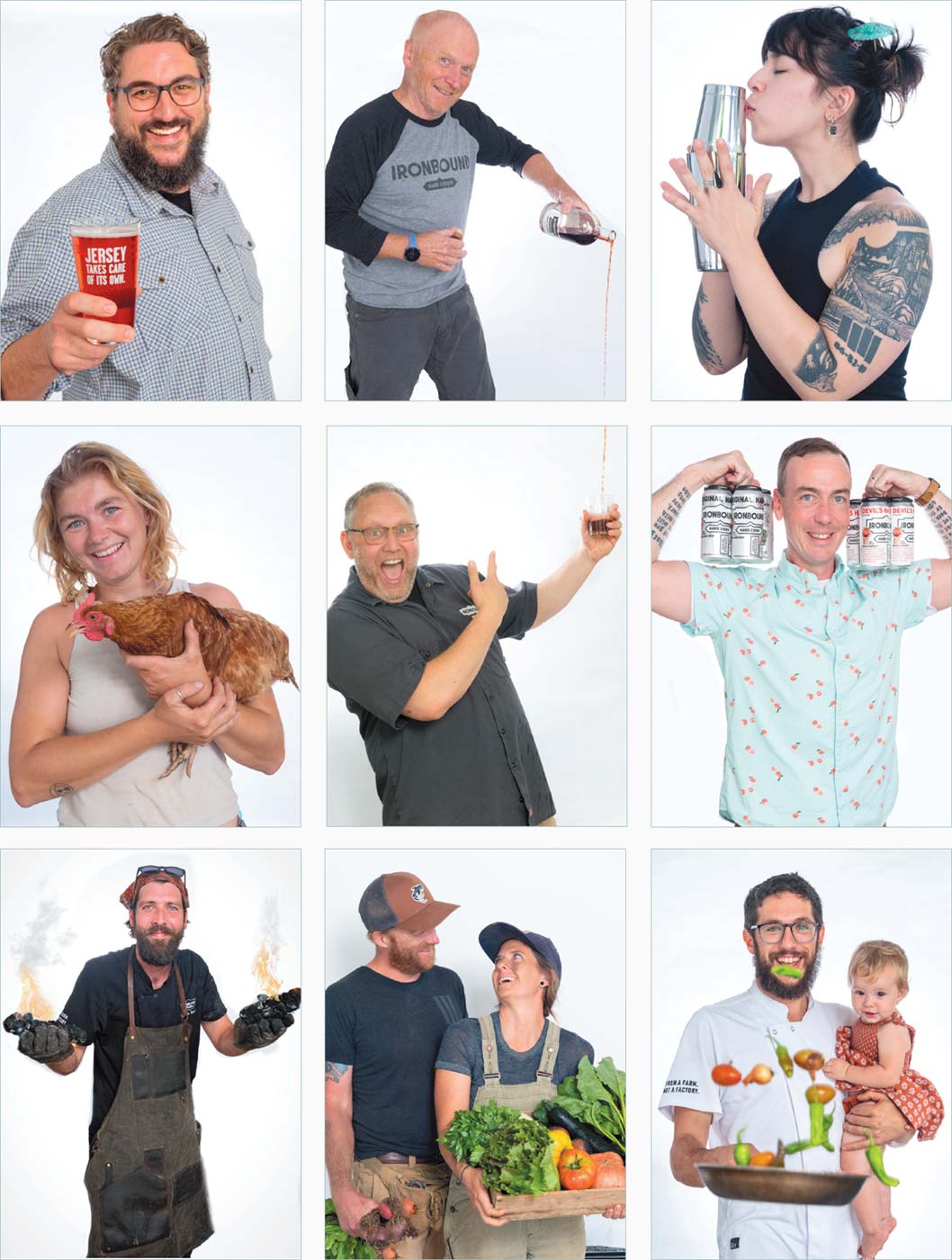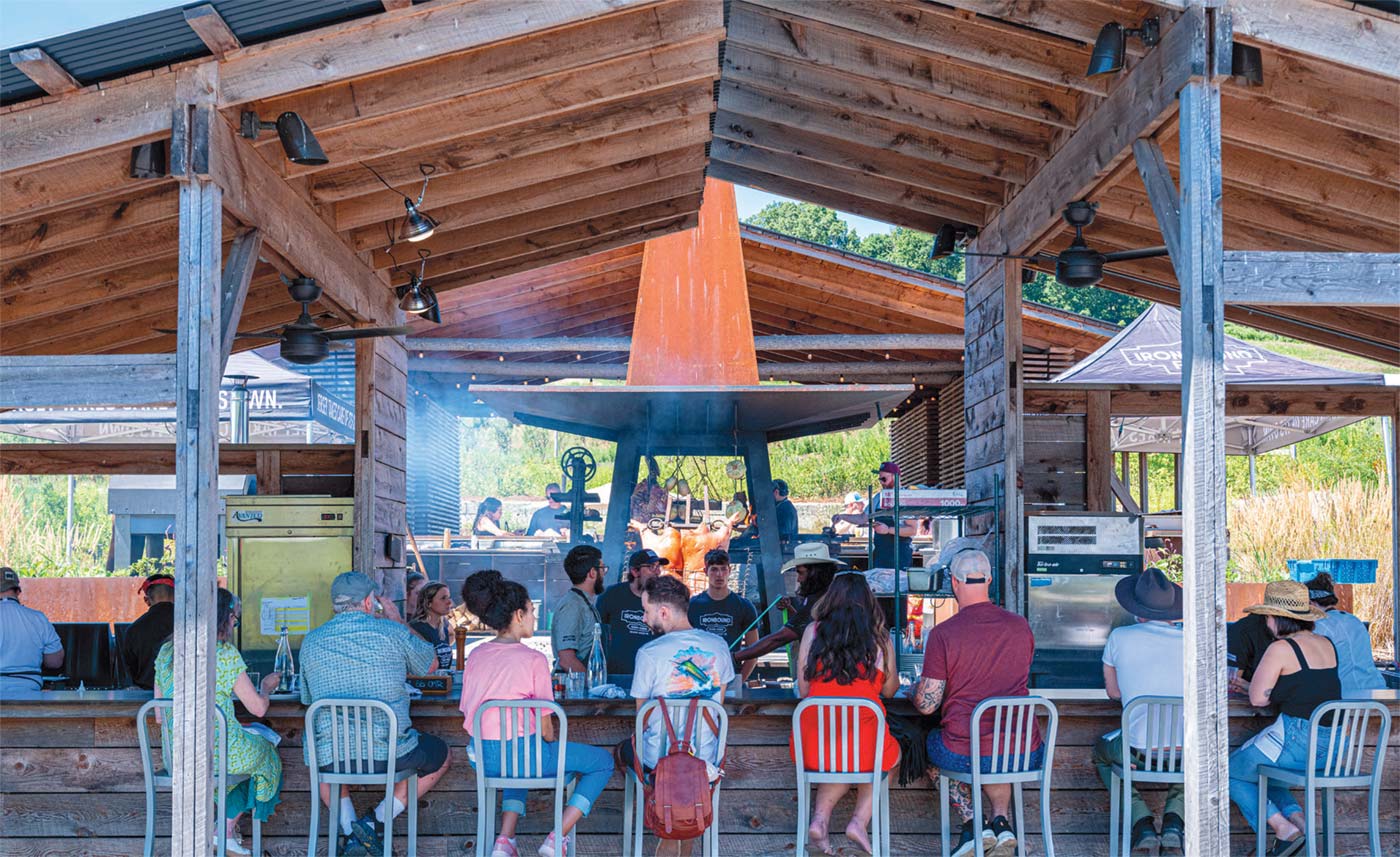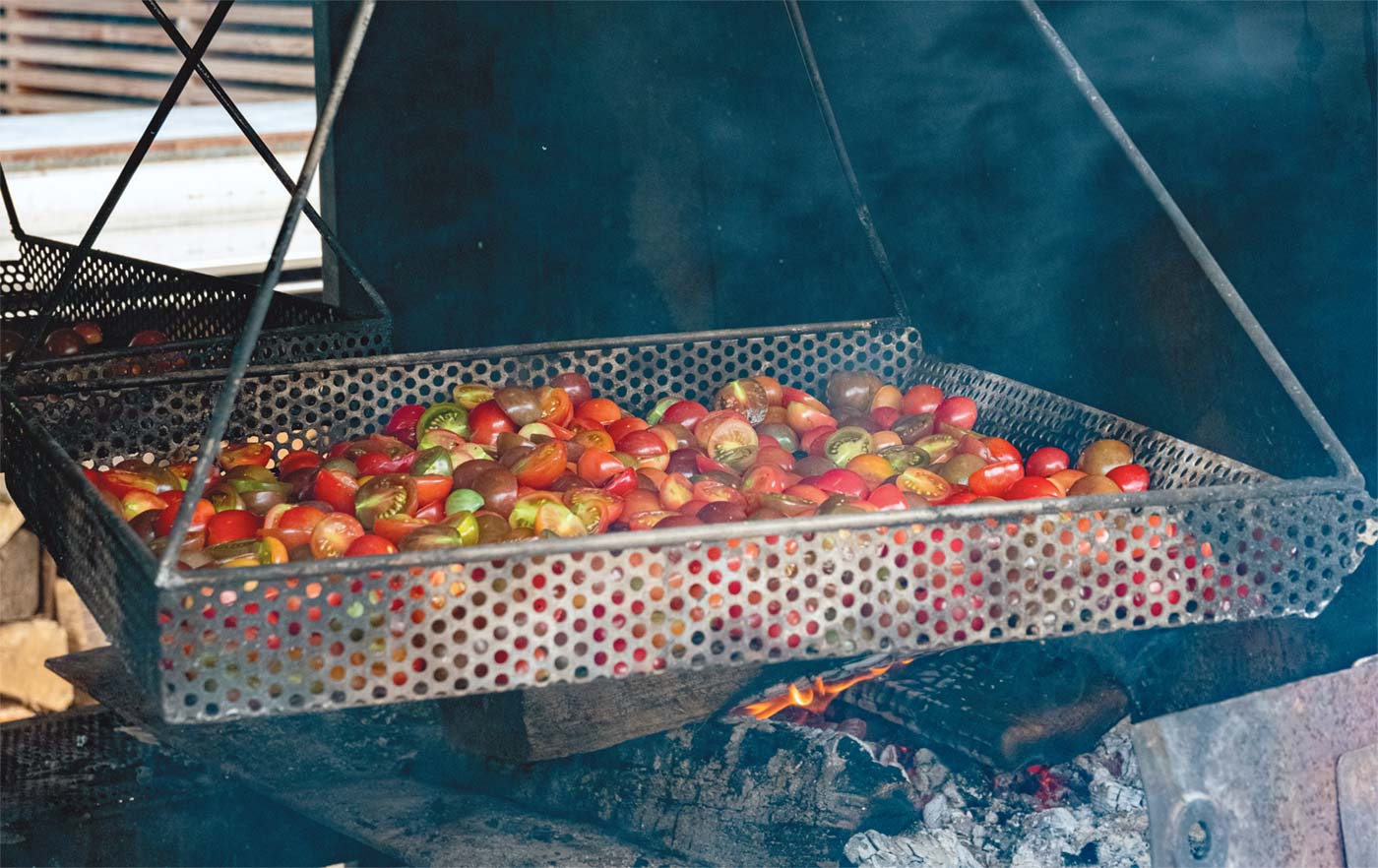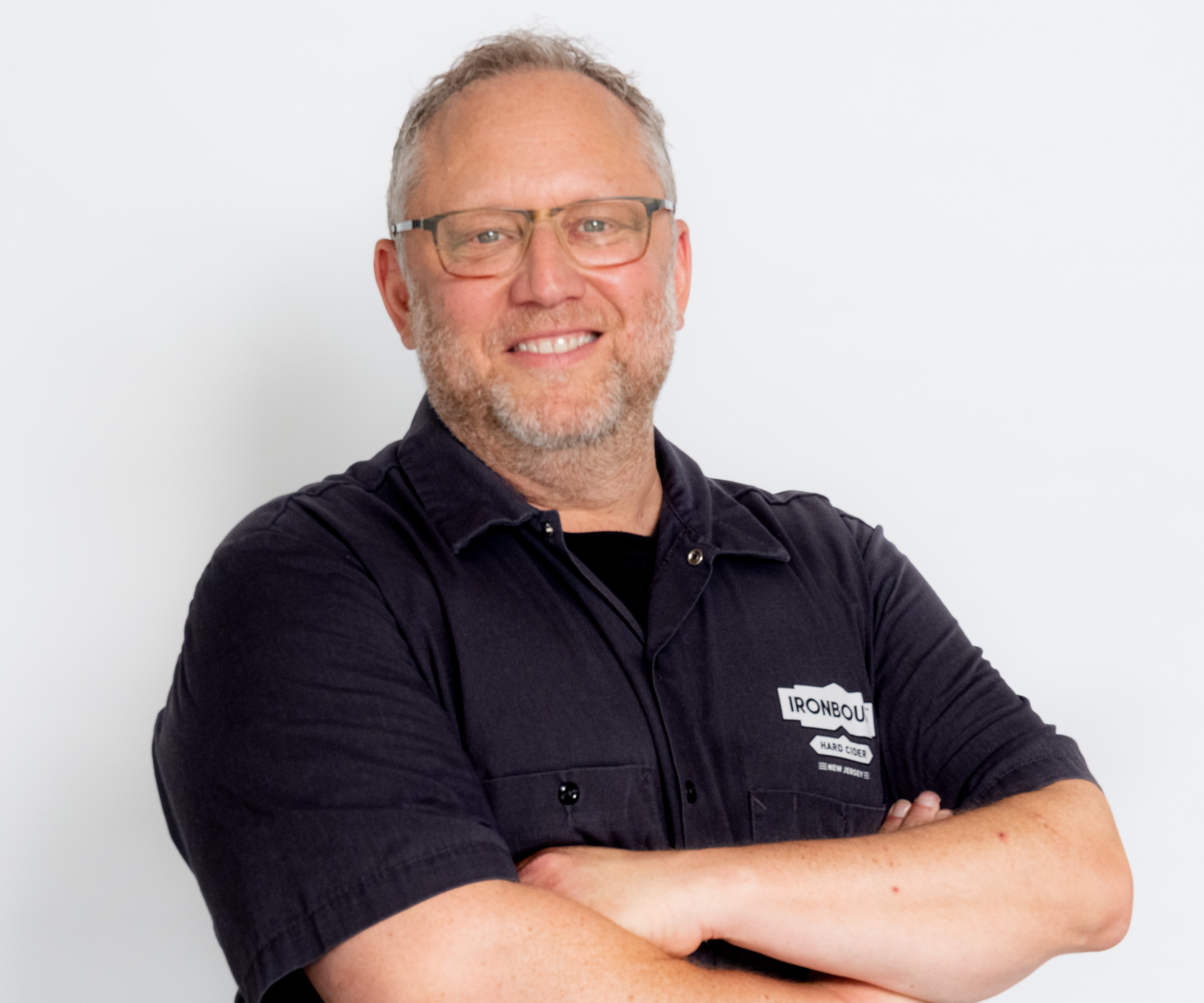Charles Rosen: Founder & CEO, Ironbound Farm

THE IRONBOUND TEAM: (top row) Dan Schneider, tasting room manager; Cameron Stark, master cidermaker & partner; Danielle Nguyen, beverage director; (middle row) Taylor Adam, livestock manager; Charles Rosen, founder & CEO; Bryan Reddy, sales director; (bottom row) Gunnar Bentley, fogista; Jay Reed, farmer, and Kat Mitchell, farm manager; Alec Gioseffi, head farmer & culinary director (with baby Lilly)
A conversation with Charles Rosen is like a ride in a time machine, going from the past to the present day to the future in the flip of a switch, covering topics ranging from global to statewide to, of course, hyper-local. He is supersmart, funny, more candid than most people you will encounter, and, let’s say, talkative. What makes this conversation even more special to highlight is that Rosen, a lawyer and former marketing executive, was inspired to start his enterprise over a decade ago after reading an article in Edible Jersey about heirloom apples, penned by Fran McManus. Fast forward, and he has led Ironbound through a metamorphosis that sees it today as a national leader in regenerative agriculture.
We sat and talked one afternoon at the beautiful 108-acre Ironbound Farm, home to Ironbound Hard Cider and New Ark Farms, in Asbury in Hunterdon County.
We aren’t going to walk through the full history of Ironbound, but some history is important. Why did you develop this current business model from where you started?
It’s because we failed epically! (laughter) And at each moment of failure, we recalibrated and tried again. The biggest lesson? We couldn’t compete with the big industrial producers for [hard cider] shelf space regardless of our quality, sourcing, etc. So instead of calling for systemic change that won’t come because that system is working as it was designed to, we needed to build a new alternative system.
The new system is rooted in regenerative agriculture, a relatively new term for a farming approach based, in large part, on ancient concepts. Here in New Jersey you are becoming a national leader in the movement. It goes deeper and wider than being good to the environment, though. How does this apply at Ironbound?
It is not just about better farming methods. It’s about building a model of horizontal integration that benefits everyone within the system—from farmers to value-add producers to chefs to our consumers. I’m simply unwilling to make a profit at the expense of employees, customers, our neighbors, and the land. I believe my success can’t come at your expense, but rather my success should be bound up with yours. There needs to be resiliency and viability for everyone along the supply chain.
I am truly inspired by the words of Joanna Macy, a 93-year-old author/theologian-environmentalist badass. She talks of “The Great Unraveling,” the result of treating the Earth as a supply warehouse and sewer. Instead of a society built on industrial growth at all costs, she believes society must be rooted in life-sustaining systems. And that’s exactly what regenerative agriculture is. So at Ironbound, we’ve learned that we can build a community-based ecosystem were everyone benefits. I think in there lies the answer to “what is my obligation to the community around me?”
How did this business model develop from farming?
It was an epiphany for me as we got engaged in changing our soil biology. What we understand from regenerative farming is that strength and resiliency come from building a diverse ecosystem in the soil, and as each organism in the soil gets stronger, the whole system gets stronger. What I learned from nature systems seems to apply to business resiliency and viability. Once I understood we can’t compete with the big industrial systems and can’t win the shelf wars, we had to build a better alternative system.
You weren’t talking like this 10 years ago.
(laughter) No, of course not! I thought we’d be selling massive amounts of cider by now!

FARMS ARE ABOUT EXPERIMENTATION AND CONTINUED INNOVATION. I LEARNED THAT IT TAKES COURAGE TO TRY, AND HUMILITY TO LEARN FROM FAILURE AND TRY AGAIN.

But your original mission was still a noble one. What happened?
The focus was on urban renewal and workforce development. We wanted to build a for-profit business based on human repair and environmental stewardship. We wanted to be social justice warriors, going into Newark, proving for-profit companies can care about the community and support their most marginalized citizens, namely ex-offenders.
Cider was one of Newark’s first major industries, and 10 years ago it was the fastest-growing alcohol drink segment. We thought sales would fund the workforce initiatives and our innovations in agriculture, but we simply did not have significant enough sales to keep funding that. Those we hired were not always ready to be working on a farm and we did not prepare them well enough and no longer had the financial resources, time, or energy to continue to teach and develop them. But I also realized my goal of building community didn’t have to go away and that led me to this new path. Now we are building a community with a number of like-minded entrepreneurs including BIPOC farmers and minority- and women-owned restaurants and value-add producers.
A new path that still had some major bumps to overcome.
Besides the challenges of the pandemic, we had to rip up 10,000 trees that we had prematurely planted before properly healing the soil. I pride myself on having a quick learning curve, but I had to learn, the hard way, to stop approaching everything aggressively and slow down. I bought a farm that was dormant for 20 years and in serious need of soil rehabilitation. I didn’t understand the time component and said we will do the healing work as we go. As a farmer, you have nature as your guide, and you sometimes learn painfully from it.
A farmer! (laughter) I know it’s not what you set out to be, but when did you start to see yourself as a farmer?
Well, one day we were planting beets (we transplant small starter plants rather than seeds in order to get a jump on the growing season). And these beets have these great purple and white rings of color just like a bull’s-eye. I was one of three people seated on the transplanter (a piece of equipment that’s pulled by a tractor that keeps us low to the ground so that we can place these plants in the soil as the wheels of the transplanter dig the holes). As I was placing hundreds of these little starter plants in the soil, I remarked to our farm manager, Alec, who was driving the tactor that the roots were the same color as the beets and he turned around and said, “that’s because the roots are the beets, you idiot!” (laughter) Of course, I knew that intellectually but it was in the hours of placing these delicate starts directly in the soil that really made me understand it. I think that’s the first moment I really felt like a farmer.
Farmers often say they are stewards of the land, but it sounds like you don’t see yourself as a steward but something more, something different.
Our website says “we are working with nature, not against it.” In reality, we are not just working with nature, we are nature. I have never felt as spiritual as I do when working the land. I feel so deeply connected to it and kind of understand the idea of the entire universe being just one thing.
Let’s get back to the team, something you brought up in conversation before I could even ask. You know over the years I have referred to you as Hurricane Charles with your folks here. (laughter)
That’s been an important part of the new model—building a team of people who are better at stuff than I am. I truly believe it’s not about me. It’s about us.
First, we wouldn’t be here today without Cam [Cameron Stark, acclaimed cidermaker and partner]. His skills were honed at some of the best wineries on both coasts and he is so adept at using so many local ingredients to craft unique and delicious products.
Alec Gioseffiand his wife, Lauren, came to us from Cherry Valley Co-op in Princeton. Alec is an incredible chef turned farmer turned chef/farmer who runs our culinary program and thinks about all of it with a farmer’s understanding of ingredients. Kat Mitchell—our farm manager, who along with her husband, Jay Reid, came to us from their own Resilient Farms in Hamilton—brings expertise in small-space intensive growing. Dan Schneider runs our tasting room after 25 years of growing up at—and eventually running—the Sterling Hotel. Gunnar Bentley does wonders around our Mother Fire (Lidia Bastianich named him “the fogista” because of his rock star skills around open-flame cooking). And Danielle Nguyen, our beverage director, takes the incredible ciders and wines Cam is making, throws in the botanicals and other ingredients the farms are growing, and creates some of the most interesting and delicious cocktails I have ever drank.
It has not been easy.
Farming is hard. I have had to learn patience and humility— two things I don’t come by very naturally! Farms are about experimentation and continued innovation. I learned that it takes courage to try, and humility to learn from failure and try again. I needed a willingness to learn from others, to embrace continual change every day. No, make that every minute of every day. I would love it if it was just every day!
Do you feel the craft industry is supported in the state?
The governor, Senator Cory Booker, Secretary of Agriculture Doug Fisher, and the head of the NJEDA, Tim Sullivan, have all visited the farm. They all have been eager to support our initiatives and are truly committed to the idea of building a local food system. The legislature has to catch up, though. Lobbying efforts on behalf of larger entities are restricting me and other craft producers from showing what we are doing and trying to achieve.
I will say, however, the County has been amazing. When Peter Leitner (owner/winemaker of Mount Salem Vineyards in Pittstown) and I approached Marc Saluk, the economic development director for Hunterdon County, with the idea for the 579 Farm and Food Trail to try to get more people here, he and his people didn’t just run with it, they expanded it. We never intended for this to be a destination, but we concluded people have to come here first to realize the value of what we are doing. As a marketing person, the slogan they came up with, “The Other Side of Jersey,” was brilliant and I wish it had been mine! (laughter)
The place looks beautiful every time I come out here.
Thanks! We have made and continue to make a lot of changes. The farming changes to the landscape including our system of berms, swales, and retention ponds meant we could weather the storms better, literally, like during Hurricane Ida, but climate change will continue to be a major concern. We have 3,000– 4,000 chickens roaming around doing pest management, pigs doing the rooting, sheep and goats doing weed management, and it all makes the farm even more magical. Guests often say, “I can’t believe this is New Jersey.”
You know, when I’m home in Montclair, I’m usually up most nights worrying about the state of the world, about the environment, about the business, about my family. But the second I am at the farm, I feel rejuvenated, restored, energized. I learned this land is magical once I was quiet enough to listen to it.
Ironbound Farm
360 County Road 579, Asbury
908.940.4115
ironboundfarm.com





